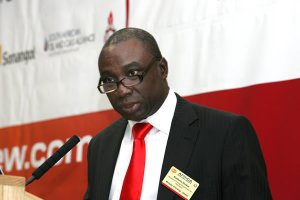- Home - News
- TWI News | TV
- Polls
- Year In Review
- News Archive
- Crime & Punishment
- Politics
- Regional
- Editorial
- Health
- Ghanaians Abroad
- Tabloid
- Africa
- Religion
- Election 2020
- Coronavirus
- News Videos | TV
- Photo Archives
- News Headlines
- Press Release
Business News of Tuesday, 4 August 2015
Source: B&FT
No more guarantees for IPPs – Kwabena Donkor
Private Investors in the power sector, otherwise known as Independent Power Producers (IPPs), should be ready to shoulder part of the risk and quit inundating government with requests for guarantees, Power Minister Dr. Kwabena Donkor has said.
With the country in a desperate search for more electricity it has become fashionable for those wanting to help to demand that the government of Ghana, through a Consent and Support Agreement, insulates them from the inability of the power off-taker -- the ECG -- to pay for it when they generate.
Almost every IPP wanting to invest in generation, and there are a lot of them these days, has asked for a Government Consent and Support Agreement, and according to the Power Minister, it is time for a pause.
“I have currently on my table more than 30 applications for various solar projects. What has been the hitch is that most of them have asked for Government Consent and Support Agreements, which I think is not right,” the minister told B&FT.
“One of the reasons we embarked on the power sector reform programme was to share the risk, take away the risk from government and let the market also absorb some of it. And therefore when the private sector comes back to government to provide them with guarantees then the risk sharing is avoided, and we do not think that is right,” the minister said.
Just as private investors are prepared to take profits, he said, they must be prepared to take some of the risk.
“Any government consent and support agreement is seen as contingent liability on government, and therefore we want to move away from that.”
Some of the companies, he said, are not just demanding the guarantees but are also asking for stand-by Letters of Credit, “and I said you cannot have it both ways”.
Indeed, to bring in the 450megawatts powership, Karpower International of Turkey asked government to put up a US$100million bond to protect it from the ECG’s financial paralysis.
As an Independent Power Producer, Karpower is supposed to shoulder all investments toward the delivery of power while the ECG will pay for power delivered as per the agreed tariff.
The Power Minister admitted, however, that some projects (large ones) may require some form of guarantees, and so with the assistance of the World Bank and the African Development Bank government is introducing partial-risk guarantees.
“But we are going to be very selective,” he said. “If you want to do a 30 or 40 megawatt solar farm, I do not see why it should go through parliament, go through cabinet, and come to parliament for government consent. However, if you have a 1,000megawatt project I will be prepared to go through that to ensure it takes off.”
The World Bank, last week, announced it is providing a US$700million Partial Risk Guarantee for the US$7billion Sankofa gas deal between government, ENI and Vitol











